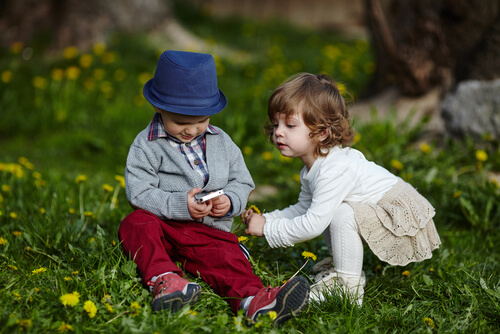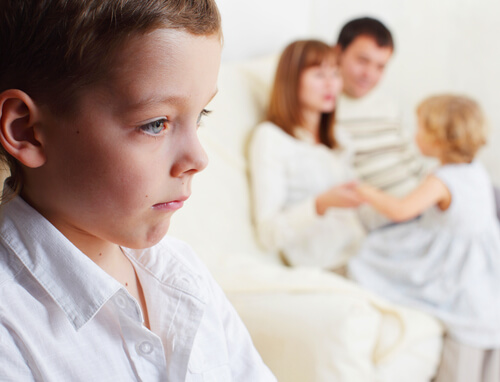Envy in Children: Causes and Solutions

Envy is a negative feeling that eats away at the soul of the person who feels it. In adults, it often relates to money problems, workplace drama and relationship troubles. But what can cause envy in children? In this article, we’ll find out.
Envy is a feeling of resentful sadness or distress about other people’s belongings or success, or a desire to possess something that is not ours. Although people often deny it, envy is a very common thing to feel.
In fact, this sentiment is practically universal. As much as we might try to avoid it, at some point in our lives we are all likely to be envious. This is a natural reaction to our social surroundings.
In many cases, we don’t feel envious because of something we lack. People who are envious may enjoy a comfortable lifestyle and be relatively privileged. Even so, they feel resentment for the happiness, material goods or even the opportunities available to others.
Envy in children: what causes it?
Envy tends to be aroused by things that are important to us. For little ones, this may be:
- Grades at school
- Toys or other material possessions
- Friends
- Physical characteristics such as being taller, thinner or stronger
- Attention from adults (mainly parents and teachers)

As we have said, envy in children and in adults is not linked to “not having” something. In many cases, children have almost everything they could possibly desire, but when they see that their friend has something they like, they immediately envy them and want it, too.
One of the explanations for this feeling could be that these children are not used to feeling “disadvantaged” in relation to others.
They have always been the ones to have what others want. When the situation is reversed, they do not enjoy it at all.
“People who are envious feel resentment for the happiness, material goods or even the opportunities available to others”
What to do about envy in children
Beyond the specific situation that has triggered this feeling, envy is also caused by an underlying lack of confidence, affection or self-esteem, which needs to be addressed.
In other words, children who always want to have more or do better than others often believe that if they do not, they will not be listened to, loved or valued.
Below are a few practical tips that can help to do away with this resentment.
Don’t compare them to other kids
Comparison is the thief of joy, as the saying goes. Don’t say: “You should be more like Peter, who gets good good grades” or “Why can’t you score a goal like John?”
You will not motivate your little one to try harder. In fact, you will be creating a spirit of unhealthy competition.
What you can do instead is set realistic goals based on your child’s own abilities. These should be achievable in the short to medium term, in order to keep the child feeling enthusiastic.
In this way, rather than doing better than the rest, you are encouraging your child to be the very best version of him or herself.
“Envy should always be taken as a reason to try harder, and never as a desire for others to do worse”
Give them attention and affection
Few things are as important during childhood as feeling wanted. The attention, understanding and respect that a child receives should not be based on their grades, sporting performance or any other kind of measurement.
Make your child feel they are important to you, whatever the circumstances. This way, they will not be overcome by envy when a sibling or friend gets something they want. Parents’ affection is the best medicine for envy.

Talk to them about their feelings
By this, we don’t just mean that you should tell them that envy has negative effects, or “forbid” them to feel envious of others. In fact, envy in children can even be channeled in a positive way.
How can you do this? Try to encourage a sense of healthy competition. That is, if a friend is getting better grades, your child could try harder to improve their own.
If another child is better at tennis, perhaps they could train together and encourage each other, or even play doubles at a competition.
Envy in children can be an important driving force. But it should always be taken as a reason to try harder, and never as a desire for others to do worse.
Finally, don’t forget that children’s behavior is merely a reflection of that of their parents. For this reason, you should avoid making malicious comments (especially in front of your child).
Help your child to develop an understanding and appreciation of the achievements of others.
All cited sources were thoroughly reviewed by our team to ensure their quality, reliability, currency, and validity. The bibliography of this article was considered reliable and of academic or scientific accuracy.
- Laura Quintanilla & Encarnación Sarriá. (2009) Emotional comprehension in an envy context in Zapotec and Spanish 3- to 5- year-old children: An exploratory study, Infancia y Aprendizaje, 32:4,499-516, DOI: 10.1174/021037009789610359
- Laura Quintanilla, Marta Giménez-Dasí. (2017) Children’s understanding of depreciation in scenarios of envy and modesty. European Journal of Developmental Psychology 14:3, pages 281-294. https://www.tandfonline.com/doi/abs/10.1080/17405629.2016.1200029
- Martínez, L. M. R. (2005). Celos y envidia: emociones humanas. UNAM.
- Montañés, M. C., & Iñiguez, C. G. (2002). Emociones sociales: enamoramiento, celos, envidia y empatía. https://www.uv.es/~choliz/EmocionesSociales.pdf
This text is provided for informational purposes only and does not replace consultation with a professional. If in doubt, consult your specialist.
